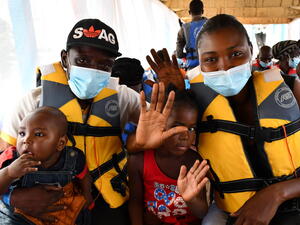Afghan returns from Iran surpass those from Pakistan, says UNHCR
Afghan returns from Iran surpass those from Pakistan, says UNHCR

Afghan refugees line up to receive rations of tea and soap from UNHCR at Ashgaro camp. It is one of 12 camps where assistance will be halted at the end of August 2004.
KABUL, July 20 (UNHCR) - Some 450,000 Afghan refugees have been repatriated so far this year, with a record high from Iran and more expected from Pakistan as assistance approaches an end in some of Pakistan's border camps.
Of the numbers who have returned to Afghanistan since January, more than 242,000 came from Iran - marking the highest pace of returns compared to similar points in the last two years - while some 210,000 came from Pakistan.
"The largest return movements are traditionally seen in the May-August period, when refugees pack up their families and return home after schools close and in time to help with the growing season in Afghanistan," explained UNHCR spokeswoman Jennifer Pagonis at a news briefing in Geneva on Tuesday.
In all, some 3.5 million Afghans have gone home since the UNHCR-organised return movements started in 2002, including more than 2 million from Pakistan, 900,000 from Iran and more than 440,000 displaced persons, while tens of thousands of other exiles have gone back on their own.
The number of returnees looks set to increase as assistance in Pakistan's "new" camps - set up near the Afghan border after the post-September 11 conflict - is halted at the end of August.
Of the new camps, there are some 127,000 in Balochistan province and another 67,000 refugees in North West Frontier province.
Refugees in the 12 affected camps - six in each of the two provinces - were informed of this in June. In a recent survey, the majority said they wished to repatriate.
On Tuesday, UNHCR sent mobile teams to the border area to assist their impending return. One of the teams is carrying mobile iris testing equipment that ensures no one receives repatriation assistance for a second time.
Refugees going back to Afghanistan from the new camps will receive an enhanced package of food and non-food items - including tents to provide temporary shelter on arrival in Afghanistan - in addition to the standard UNHCR repatriation package received by previous returnees.
All refugees receive a travel grant of $3 to $30 depending on the distance to their homes, plus $8 in cash instead of additional assistance such as food that was provided in the first two years of the programme. Those dismantling their homes to take construction materials back to Afghanistan receive an extra $5. All benefits are paid after arrival in Afghanistan.
In addition, families leaving the new camps will receive the full food rations they would get from the World Food Programme in July and August, even if they leave this month.
"UNHCR is discussing with the Pakistan government possible new locations for those refugees who remain after the 1 September deadline," said Pagonis. "The government does not want them to continue living in the camps because of security, but remains committed in principle to only voluntary repatriation."
The UN refugee agency will meet with the governments of Pakistan and Afghanistan on Wednesday to discuss repatriation issues.
In a separate development, UNHCR on Monday signed a memorandum of understanding with Islamabad's International Islamic University to start Pakistan's first full university course in international refugee law in September this year.








